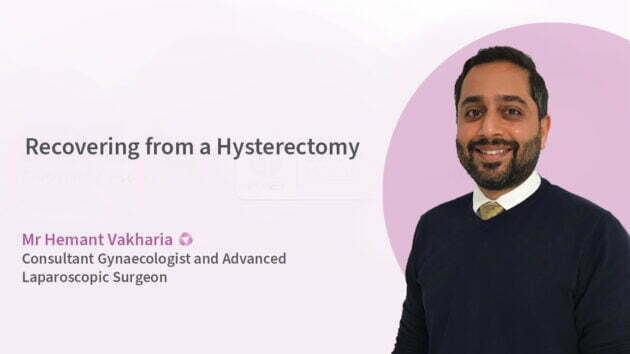
Recovering from a Hysterectomy
In this article, Mr Hemant Vakharia, our consultant gynaecologist and advanced laparoscopic surgeon talks in detail and shares insight about how to prepare for a hysterectomy and the importance of preparation to the recovery process. Mr Vakharia also discusses what to expect at the start of your procedure, risk factors and how to minimise these risks while sharing advice to help you during the recovery process.
Here, Mr Vakharia shares:
A hysterectomy can be performed through the vagina or through the abdomen and over last 35 years, advancements in medical technology have seen them performed both laparoscopically and robotically. The exact route depends on one’s individual circumstances and is often decided upon following a discussion with your gynaecologist.
I am often asked by patients what to expect when recovering from a hysterectomy and almost universally I am faced with a look of surprise when I suggest that preparation for your recovery starts from the point you are listed for the procedure. I will explain more about this a little bit later in this post.
The word ‘hysterectomy’ is derived from the Greek ‘hustera’ meaning ‘womb’ and the Greek ‘-ektomia’ meaning ‘a cutting out of’.
So what about recovery?
As mentioned above, I firmly believe that planning your recovery is essential and begins the very minute you decide to have the procedure. The procedure itself should be regarded as major surgery and as such it represents a stress on one’s body. Therefore, it is vital you prepare in order to make your recovery as smooth as possible.
I often draw parallels with preparing for a marathon, as those planning on running a marathon would spend the weeks and months leading up to the event by modifying their diet and regularly running long distances to improve their endurance.
In the same vein, preparing for surgery should involve a similar process to improve your overall cardiovascular health. Partaking in 30 minutes a day of aerobic exercise (jogging, running, cycling, swimming) in the weeks leading up to surgery will be very beneficial. Clearly, this depends on individual circumstances and ultimately the reason the hysterectomy is being performed as for some this may not be possible if they are suffering from pain or have other medical problems that limit their mobility. That said, measures such as stopping smoking and eating a healthy diet should be applicable to all.
In addition to your underlying health status, the duration of your hospital stay and recovery period are influenced by the route of surgery. Vaginal hysterectomies and laparoscopic (key-hole) or robotic hysterectomies usually involve an overnight stay whereas open (large cut in the abdomen) procedures will often require a stay of 2-3 nights depending upon your individual circumstances. Data from studies 1 has shown that women undergoing a laparoscopic hysterectomy resumed normal activities 13.6 days sooner than those who had an open procedure.
Important considerations
There are a number of important considerations after surgery that your surgeon will talk to you about and talking through them often forms part of the consent process. These are discussed below.
Infection
At the start of your procedure, you will be given a dose of antibiotics via a drip. In general, this is all you will need but in some cases your surgeon may ask you to take an extended course. Post-operatively to reduce your risk of infection it is important to keep your wound clean and dry. Washing your hands with soap and water prior to touching the area is very important and will help minimise the risk of infection. If the area becomes red, starts to ooze or discharge offensive fluid then you should contact your surgeon for review in case you need a course of antibiotics.
Venous Thrombosis (Clots)
Surgery can increase your risk of developing a clot in the legs or lungs and to reduce this risk, during your surgery, you will be asked to wear compression stockings and will have some boots applied to your calves that circulate the blood in your veins. Following your surgery, whilst you are in hospital, you may also be given a blood-thinning injection to reduce your risk of developing a clot. Depending on your individual circumstances, you may also be asked to take some at home for a few days.
Your risk can be reduced further by keeping hydrated and mobile after your surgery. Walking even a short distance a few times a day will increase the circulation of blood in your legs and be very beneficial.
Pain
Following surgery, it is normal to experience some pain and you will be given some pain medication to take at home. For the first few days it is often necessary to take these regularly rather than waiting until the pain arises. This is important to allow you to mobilise following your surgery and to prevent you from experiencing excessive waves of pain. Supporting your wound when you cough, laugh or sneeze is important and will also help reduce pain.
The wound will be tender and you may experience some numbness around it. You may also experience some discomfort in the vagina. Any sudden severe pain should be discussed with your doctor.
Heavy Lifting
Lifting objects is another concern for patients undergoing surgery, whether this is at home or when they return to work. It is important to limit any lifting in the first few weeks after surgery and then to gradually build up once you feel able. Straining of any sort can cause the wound to open which can lead to bleeding or infection entering the wound. For those who undergo an open procedure, excessive straining can increase the risk of developing a hernia.
Driving
Advice on driving varies greatly and again will depend upon the route of surgery and your other medical problems. It is imperative that before you considering driving again after surgery you have consulted your insurance company to see if you are covered to do so and that you feel fully able. Advice generally varies from refraining from driving for around 6-8 weeks again largely dependent on your specific case.
Once cleared to do so by your insurance company, it is a good idea to sit in your car, and practice pressing the clutch/brake and changing gears to see if this causes you any discomfort. Crucially you need to be able to perform an emergency stop and if pressing the pedals causes you pain, you should refrain from driving.
Intercourse
It is normal after any form surgery to witness a reduction in your libido and when to safely resume sexual activity after a hysterectomy is a concern for most patients. There are a number of factors to consider and some depend upon the type of surgery you have had.
In women who have undergone a total hysterectomy (either open or laparoscopic) or a vaginal hysterectomy, the top of the vagina (vaginal vault) needs time to heal and generally you should avoid intercourse for at least 6-8 weeks.
In women who have had their ovaries removed too, they may experience some vaginal dryness. Your doctor will have discussed the implications of having your ovaries removed prior to your surgery and will have discussed hormone replacement therapy (HRT)based on your specific needs. If you are not able to take HRT or have decided not to have it, a vaginal lubricant can really help with intercourse and dryness.
If you experience any bleeding after intercourse following your surgery you should discuss this with your doctor.
Going to the toilet
Following your surgery, it is important to make sure you avoid constipation. Some pain medications can cause constipation so it is worthwhile increasing the fibre in your diet and taking natural remedies such as prune juice and flax seeds. If these measures are not enough or you suffer with constipation regularly you may need to speak to your doctor and have some laxatives prescribed.
Passing urine can sometimes be a little sore immediately after the procedure as you will have had a catheter in. The catheter is removed as soon as possible after surgery but does depend on how mobile you are and how complicated the surgery has been. It is important to regularly pass urine following your surgery and avoid over filling your bladder which in turn can lead to pain.
If you experience any persistent burning when passing urine or a foul smell to your urine you should contact your doctor to rule out a urine infection.
Make an Appointment
London Gynaecology is private gynaecology practice led by a team of consultant gynaecologists at our practice locations at The Portland Hospital and Austin Friars, City of London. As a practice, we pride ourselves on providing a first-class service at the entire stage of the patient pathway.
If you would like to make an appointment with Mr Hemant Vakharia or any other member of the London Gynaecology team, you can now do so by booking directly online, here. Or please call our team on 020 7101 1700. or email [email protected].



